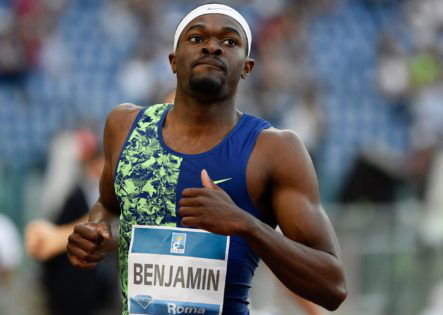
Getty
EUGENE, OREGON – JUNE 26: Rai Benjamin celebrates after the Men’s 400 Meters Hurdles Finals on day nine of the 2020 U.S. Olympic Track & Field Team Trials at Hayward Field on June 26, 2021 in Eugene, Oregon. (Photo by Steph Chambers/Getty Images)

Getty
EUGENE, OREGON – JUNE 26: Rai Benjamin celebrates after the Men’s 400 Meters Hurdles Finals on day nine of the 2020 U.S. Olympic Track & Field Team Trials at Hayward Field on June 26, 2021 in Eugene, Oregon. (Photo by Steph Chambers/Getty Images)
Track and field is the ultimate test of human speed, strength, and endurance, but it’s also a brutal grind that chews up even the toughest athletes. From hamstring pulls to stress fractures, the sport’s high-stakes demands leave competitors battered, forcing them to weigh their health against the pressure to perform. Particularly, when leagues have ill timings and prolong further. Enter Rai Benjamin, Olympic medalist and track superstar, who recently dropped a truth bomb on the Beyond The Records Podcast that’s got fans buzzing.
Watch What’s Trending Now!
Benjamin called out the Grand Slam Track (GST) model, a shiny new series aiming to pit the best against the best, saying its timing and expectations are a recipe for disaster. His raw take? When injuries strike, no amount of money or signed contracts will keep athletes on the starting line. “If you run a 100 <m>, you are cooked for the rest of the season.”, stated the Olympic champion on the podcast, further highlighting just how excruciating track is on a physical level. Michael Johnson’s Grand Slam Track is exciting prospect, but is it as appealing when you are battered from a stressful season? Rai Benjamin disagrees.
On the Podcast, Benjamin didn’t hold back. The Olympian leveled criticisms against the track meet on grounds of long-term profitability as well. He has had a lot to say. Tearing into the GST’s premise that top athletes will always show up, no matter what. “Having a track meet under the premise that the best is always going to compete against the best and they’re getting paid to show up, that doesn’t matter when your shit hurts, bro,” he said, his frustration palpable. He zeroed in on the ill-timed scheduling—early-season meets in April, when athletes are still shaking off training niggles or recovering from grueling winter sessions.
“When your shit hurts in April and you’re like, ‘Is this a good idea for me to go get on a plane and travel all the way here just to run because I signed on the dotted line?’” Benjamin asked, painting a vivid picture of an athlete limping through a meet or risking further injury just to honor a contract. His point? The GST’s structure ignores the sport’s unpredictable nature, and fans shouldn’t be surprised when stars pull out. But why are these early-season meets such a problem?

Track and field’s physical demands are relentless. Athletes push their bodies to the brink in training, and minor “nags”—as Benjamin calls them—can flare up at any moment. “You’re going to be at practice, you’re going to have a nag here, a nag there, like things are going to happen,” he explained. The GST’s early-April events, designed to kick off the season with a bang, clash with this reality. At this stage, many athletes are still building fitness or nursing lingering issues from intense off-season workouts. Traveling long distances to compete, only to jog in the back or aggravate an injury, isn’t just inconvenient—it’s “terrible,” per Benjamin. He warned, “You’re going to see athletes pull out because it’s track and field… shit happens, bro.”
The inaugural GST meet already saw contracted athletes withdraw, a sign of trouble for a series banking on star power. So, what’s at stake when athletes prioritize health over contracts?
Injury Scare Forced Some Athletes to Withdraw from Grand Slam Track
Track and field fans were hyped for the inaugural Grand Slam Track (GST) meet in Kingston, Jamaica, expecting a clash of titans to kick off the 2025 season. But the hype took a hit when injury scares sidelined several stars, including Nigerian sprint queen Favour Ofili. The event organizers confirmed that Ofili was among the ten athletes who withdrew, citing injuries and unexpected circumstances. She was replaced by Jamaican sprinter Jodean Williams in the women’s 100m and 200m, a move Senior Director of Racing Kyle Merber defended as maintaining the meet’s high standard.
“While injuries and unexpected circumstances are out of our control, we’ve chosen to be transparent with fans rather than keep them in the dark,” Merber said. Ofili’s absence stung, especially after her 2024 Olympic 200m bronze, leaving fans wondering if the GST’s early-April timing is too risky for athletes still ramping up. How many more stars might skip future Slams due to similar setbacks?
The injury bug didn’t stop at Ofili. Signed Racers Devon Allen and Luis Grijalva also pulled out of the Kingston Slam due to injuries, forcing organizers to tap additional Challengers to fill the gaps. Allen, a dual-sport hurdler with a 12.84-second 110m hurdles personal best, and Grijalva, a Guatemalan distance runner with multiple national records, were major losses for the meet’s star power.

Reuters
Paris 2024 Olympics – Athletics – Men’s 4 x 400m Relay Final – Stade de France, Saint-Denis, France – August 10, 2024. Rai Benjamin of United States celebrates after winning gold. REUTERS/Sarah Meyssonnier
Merber assured fans that replacements like Jodean Williams, Zandrion Barnes, and Omar McLeod were “high-quality competitors who will contend for wins,” but the withdrawals highlighted the track’s brutal unpredictability. With ten athletes already scratched from the inaugural event, the GST’s vision of consistent elite showdowns faces a reality check. Can the series adapt its schedule or contract terms to keep athletes healthy and fans satisfied? Fans were left wondering if the GST’s early-April timing, when athletes are still fine-tuning their bodies, sets the stage for these setbacks. Can the series rebound and deliver the epic showdowns fans crave?

